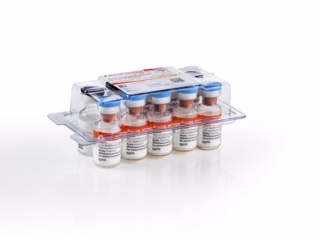Zoetis has introduced a single dose vial of its Rispoval RS+Pi3 Intranasal vaccine.

Rispoval RS+Pi3 Intranasal
According to Zoetis, it will mean farmers do not have to wait to batch calves in groups for vaccination or rely on multi-dose packs.
Rispoval RS+Pi3 Intranasal vaccine is reconstituted before use by mixing a powder with sterile diluent. Once mixed, the shelf life is two hours.
This means that any vaccine remaining in the multi-dose packs should not be used after two hours.
Rispoval RS+Pi3 Intranasal vaccine is designed to protect against two primary viral causes of pneumonia in young calves, RSV and Pi3.
The vaccine can be used from nine days of age, with onset of immunity to RSV and Pi3 at five days and 10 days, respectively after vaccination.
Zoetis vet Mary Newman advises that viruses are the instigator of a majority of respiratory health problems.
“Good respiratory health is essential in young pre-weaned calves to ensure development is not hindered in the crucial first eight weeks of life.
“Both Irish and international research on calf health and development clearly indicates that calf health and growth rates in the first few weeks of life are massively significant for an animal to achieve their lifetime potential.
“We know that pneumonia in the young pre-weaned calf can reduce growth rates by 3-9% which cannot be recovered despite compensatory feeding,” she said.
Newman also said that the loss in growth rate is reflected in reduced lactation yields later in life and it is estimated that 67% of pneumonia cases occur in calves less than three months of age.
Whether suckled or reared, calves that don’t grow effectively in the early weeks are unlikely to catch up later.
“On both dairy and beef units, proactive management of the calf living space, nutrition and disease resilience is critical to maximise lifetime productivity, which is clearly so important under today’s farm business economics,” she said.
